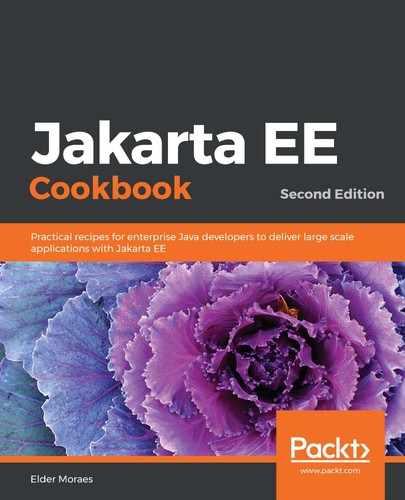Book Description
An enterprise Java developer's guide to learning JAX-RS, context and dependency injection, JavaServer Faces (JSF), and microservices with Eclipse MicroProfile using the latest features of Jakarta EE
Key Features
- Explore Jakarta EE's latest features and API specifications and discover their benefits
- Build and deploy microservices using Jakarta EE 8 and Eclipse MicroProfile
- Build robust RESTful web services for various enterprise scenarios using the JAX-RS, JSON-P, and JSON-B APIs
Book Description
Jakarta EE is widely used around the world for developing enterprise applications for a variety of domains. With this book, Java professionals will be able to enhance their skills to deliver powerful enterprise solutions using practical recipes.
This second edition of the Jakarta EE Cookbook takes you through the improvements introduced in its latest version and helps you get hands-on with its significant APIs and features used for server-side development. You'll use Jakarta EE for creating RESTful web services and web applications with the JAX-RS, JSON-P, and JSON-B APIs and learn how you can improve the security of your enterprise solutions. Not only will you learn how to use the most important servers on the market, but you'll also learn to make the best of what they have to offer for your project. From an architectural point of view, this Jakarta book covers microservices, cloud computing, and containers. It allows you to explore all the tools for building reactive applications using Jakarta EE and core Java features such as lambdas. Finally, you'll discover how professionals can improve their projects by engaging with and contributing to the community.
By the end of this book, you'll have become proficient in developing and deploying enterprise applications using Jakarta EE.
What you will learn
- Work with Jakarta EE's most commonly used APIs and features for server-side development
- Enable fast and secure communication in web applications with the help of HTTP2
- Build enterprise applications with reusable components
- Break down monoliths into microservices using Jakarta EE and Eclipse MicroProfile
- Improve your enterprise applications with multithreading and concurrency
- Run applications in the cloud with the help of containers
- Get to grips with continuous delivery and deployment for shipping your applications effectively
Who this book is for
This book is for Java EE developers who want to build enterprise applications or update their legacy apps with Jakarta EE's latest features and specifications. Some experience of working with Java EE and knowledge of web and cloud computing will assist with understanding the concepts covered in this book.
Table of Contents
- Title Page
- Copyright and Credits
- Dedication
- About Packt
- Foreword
- Contributors
- Preface
- New Features and Improvements
- Running your first Jakarta Bean Validation 2.0 code
- Running your first Jakarta CDI 2.0 code
- Running your first JAX-RS 2.1 code
- Running your first JSF 2.3 code 
- Running your first JSON-P 1.1 code 
- Running your first JSON-B 1.0 code 
- Running your first Jakarta Servlet 4.0 code 
- Running your first Jakarta Security code 
- Running your first MVC 1.0 code 
- Server-Side Development
- Using Jakarta CDI to inject context and dependencies
- Using Jakarta Bean Validation for data validation
- Using Jakarta Servlet for request and response management
- Using Server Push to make objects available beforehand
- Using EJB and JTA for transaction management
- Using EJB to deal with concurrency
- Using JPA for smart data persistence
- Using EJB and JPA for data caching
- Using Jakarta Batch processing
- Building Powerful Services with JSON and RESTful Features
- Web and Client-Server Communication
- Security of the Enterprise Architecture
- Reducing Coding Effort by Relying on Standards
- Deploying and Managing Applications on Major Jakarta EE Servers
- Building Lightweight Solutions Using Microservices
- Building microservices from a monolith
- Building decoupled services
- Building an automated pipeline for microservices
- Determining the state of a microservice by using the MicroProfile Health Check API
- Generating and/or monitoring metrics with the MicroProfile Metrics API
- Exposing API documentation using the MicroProfile OpenAPI
- Using Multithreading on Enterprise Context
- Using Event-Driven Programming to Build Reactive Applications
- Building reactive applications using asynchronous servlets
- Building reactive applications using events and observers
- Building reactive applications using WebSocket
- Building reactive applications using message-driven beans
- Building reactive applications using Jakarta RESTful Web Services
- Building reactive applications using asynchronous session beans
- Using lambdas and CompletableFuture to improve reactive applications
- Rising to the Cloud - Jakarta EE, Containers, and Cloud Computing
- Appendix - The Power of Sharing Knowledge
- Other Books You May Enjoy
